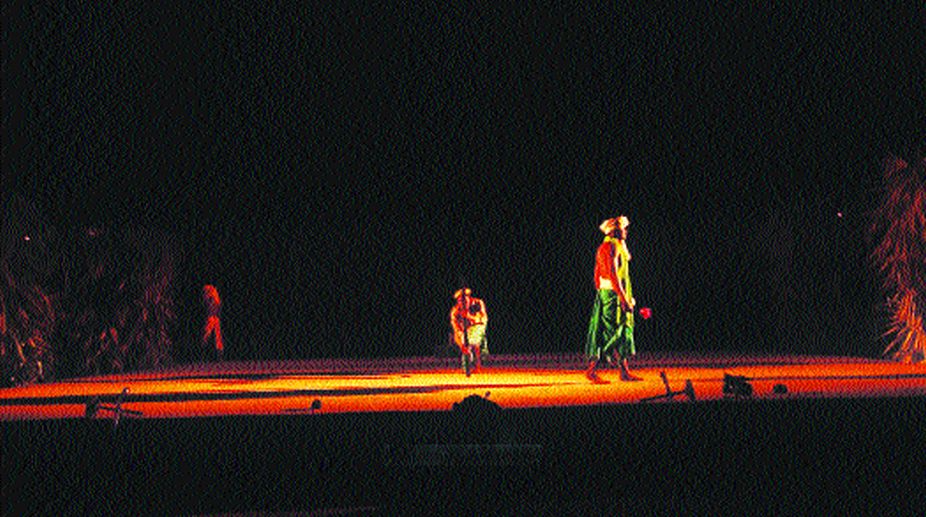The bygone bardic battles of Bengal
Far more than a mere musical pursuit, Kabi Gaan boasts an illustrious heritage, its roots firmly embedded in the fertile soil of 18th century-Bengal’s rural landscape.

Theatre in Bengal — or anywhere else for that matter — has seldom seen such commitment. There are no high stakes, no big advertisements, not even a regular stage for the kind of theatre that Partha Gupta has converted into a mission. The graduate from the drama department of Visva Bharati University had a brief encounter with painting before he realised that the theatre was a stronger medium of expression.
That was primarily because he intended to make the theatre a product of the soil that has nurtured him.
His theatre is presented in the vast landscape of Birbhum — just over an acre of land which is not only his home but also the centre of all his creative ideas. He himself may have been creatively sustained by the formal education he had received from Visva Bharati but the team that now forms the Birbhum Blossom Theatre, which was started more than 10 years ago, consists of the men and women of the soil.
The freezing climate of Dwaronda provided just the right open-air setting for Gupta’s unique interpretation of Tagore’s Muktadhara. As an audience from the neighbouring villages on the outskirts of Santiniketan streamed in, a group of Adivasi performers showed how the Nobel Laureate’s message of freedom could be presented in Santhali and inspire not just a group of unlettered tribal people but also the audience from 30 neighbouring villages that was treated to a rare experience. Gupta confesses that it was not his objective to offer a literal translation of the play. Instead, it was not just the physical barriers that people encountered but also the barriers of the mind and spirit that needed to be removed from the stream of life. The play was thus clipped to its essentials and fleshed out with the music and dance that came naturally to the tribal people. Whether they had grasped the complexities of the play was less important than the fact that this version of Muktadhara was a visual delight in a natural setting creatively designed with the help of the people themselves.
Advertisement
The audience marvelled at the large stage made of mud after months of labour. The wings were made of branches chopped from trees while the frugal props matched the quality of life with which the play’s ideas were integrated with superb craftsmanship. It was clear that the director and overall team leader, Gupta, was using all the technical skills he had acquired in his study of theatre to promote the social and creative awareness among the local population to which he has now dedicated his life. While the makeshift stage had been built by the tribal people, the lighting had been designed by the director with technical equipment brought over from Kolkata. The difference between the technically advanced theatre produced by established groups and the makeshift performances arising from the soil was only too conspicuous. But a visitor like Ashok Mukhopadhyay, who heads Theatre Workshop in Kolkata, could only explode with appreciation for the honesty and integrity with which the tribal people, spearheaded by Gupta, had produced a unique interpretation of Muktadhara.
Mukhopadhayay had been invited to speak on the interpretation of Shakespeare in the Bengali theatre before the performance of Muktadhara. In keeping with the objectives of the Birbhum Blossom Theatre, he said that it was the content of the Shakespeare plays that mattered more than the language.
The work that had been done with the tribal people over the past 11 years had been justified by the results that had been achieved. Gupta went on to say that he himself had toyed with the idea of doing Shakespeare but had later settled for Tagore. After doing Raktakarabi last year, he had been inspired to take up the more complex theme of Muktadhara this year. The final result should be
a trilogy with Raja, probably next year.
Whether it is Shakespeare or Tagore, the inspiration that Gupta had derived from Ratan Thiyam in Manipur has taught him to remain true to his roots. The Manipuri stalwart of the theatre had given him the opportunity to organise a tribal dance festival under the banner of the Sangeet Natak Akademi in Dwaronda in 2011. That was the plant that has now grown into a tree of artistic consciousness among the tribal people. The land that belongs to Gupta’s family has now acquired a more meaningful identity of tribal theatre. Gupta is firm on sustaining the creative spirit that has found strong roots.
Advertisement